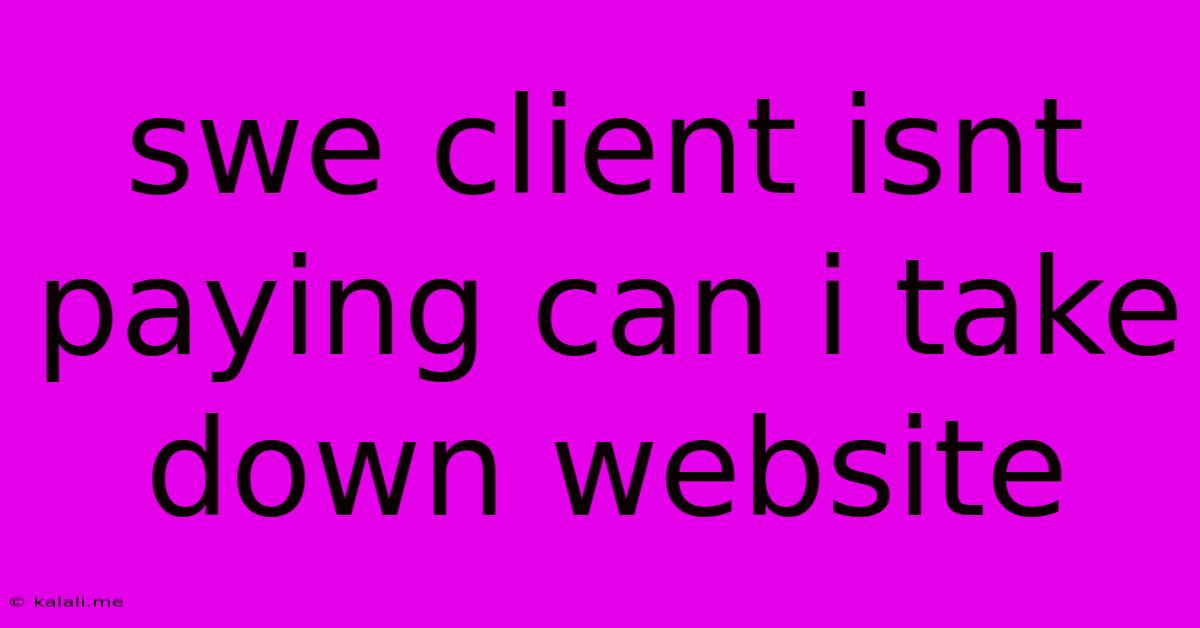Swe Client Isnt Paying Can I Take Down Website
Kalali
May 23, 2025 · 3 min read

Table of Contents
Can I Take Down My Client's Website If They Aren't Paying? Navigating Non-Payment Disputes
So, your client isn't paying their invoices. You've sent reminders, made calls, and maybe even sent a formal demand letter. Now you're considering the nuclear option: taking down their website. Before you hit that delete button, understand the legal and ethical implications involved. This article will explore your options and help you navigate this difficult situation. Taking down a client's website without proper legal grounds can have serious repercussions.
Understanding Your Contract
The first, and arguably most crucial, step is to thoroughly review your contract with the client. Does it explicitly outline the consequences of non-payment? Many contracts include clauses regarding termination of service for non-payment, often specifying a grace period before action can be taken. Pay close attention to the specifics of these clauses. These clauses may detail a process for termination that you must follow, such as providing written notice within a certain timeframe. Failing to adhere to these contractual stipulations could weaken your legal standing. If your contract lacks clear stipulations regarding non-payment, you'll need a more nuanced approach.
Legal Recourse: Beyond Website Removal
Simply taking down the website is rarely the best solution, and often the riskiest. It's almost certainly a breach of contract if your contract doesn't allow it. Before considering such drastic measures, explore other avenues:
- Formal Demand Letter: A well-crafted demand letter, sent via certified mail with return receipt requested, formally outlines the outstanding debt and sets a deadline for payment. This creates a paper trail, crucial for any future legal actions.
- Small Claims Court: For smaller debts, small claims court can be a relatively inexpensive and efficient way to recover your fees. Be prepared to present your contract, invoices, and any communication regarding payment.
- Collection Agency: A collection agency can pursue payment on your behalf, though they typically take a percentage of the recovered amount.
- Legal Counsel: Consulting with an attorney specializing in contract law and business disputes is highly recommended. They can advise you on the best course of action based on your specific circumstances and jurisdiction.
The Risks of Taking Down the Website
Taking down a client's website unilaterally, without clear contractual permission or a court order, carries significant risks:
- Breach of Contract: This could expose you to legal action from the client, potentially resulting in costly lawsuits and reputational damage.
- Damage to Reputation: Taking such aggressive action might damage your professional reputation and scare away future clients.
- Data Loss: If you're hosting the website, consider the potential loss of the client's data. You could face legal action for data loss, even if it's unintentional.
Alternative Solutions: Prioritizing Client Communication
Before resorting to extreme measures, consider these strategies:
- Open Communication: Maintain clear and consistent communication with the client. Attempt to understand their reasons for non-payment and explore potential payment plans.
- Partial Payment: Consider accepting a partial payment to demonstrate goodwill and maintain a working relationship, while protecting your financial interests.
- Referral to a Third Party: If the non-payment stems from a dispute, consider mediating the issue with a neutral third party.
Conclusion: Professionalism and Legal Prudence
While the frustration of non-payment is understandable, taking down a client's website without following proper legal channels is generally ill-advised. Prioritize open communication, explore all legal options, and carefully consider the potential consequences before taking any drastic action. Consulting a legal professional is crucial to protect your business and avoid costly mistakes. Remember, preserving your professional reputation is just as important as recovering outstanding fees.
Latest Posts
Latest Posts
-
Power Automate One Flow To Handle Multiple Form Responses
May 23, 2025
-
Blender Stack Trace 0x000001cfa70a3e00 Symbols Not Available
May 23, 2025
-
5e Object Interaction To Swap Weapons
May 23, 2025
-
Novel About People Who Photosynthesize Sociology
May 23, 2025
-
How To Know If Chicken Is Undercooked
May 23, 2025
Related Post
Thank you for visiting our website which covers about Swe Client Isnt Paying Can I Take Down Website . We hope the information provided has been useful to you. Feel free to contact us if you have any questions or need further assistance. See you next time and don't miss to bookmark.